Studies Find Quercetin & Natto K2 INHIBIT P-Glycoprotein; Will This Increase Ivermectin Toxicity Susceptibility?!
A War On P-Glycoprotein?
Video walkthrough now available:
We’ve discussed the role of P-glycoprotein in reducing ivermectin toxicity by limiting the toxic pesticide’s exposure to our brains and testes (among other vital tissues). In that article we also covered how ivermectin, hydroxychloriquine & some statins are P-glycoprotein inhibitors, which means they weaken the Pgp defenses against ivermectin at some very important tissues.
Today, I want to cover two more Pgp inhibitors: quercetin & natto, which have been pushed by some people who also promote ivermectin.
Natto K2 Inhibits Caco-2 Cells’ Pgp & Digoxin Flux
In a paper called ‘Inhibition of P-glycoprotein in Caco-2 cells: effects of herbal remedies frequently used by cancer patients’ by Engdal and Nilsen, the researchers examined Natto K2’s inhibition of digoxin flux for Caco-2 human colorectal adenocarcinoma cells line (full report). Natto K2 is a type of “Vitamin K2” found in many “Vitamin K2” supplements as well as included in various nattokinase products (unless it is removed entirely from the natto) Digoxin is a Pgp substrate.
“This study shows that … Natto K2 … inhibit[s] P-gp in vitro.”
“Special attention should be paid .. to Natto K2 due to low IC50 value and IC50/IC25 ratio”
Quercetin Vs Pgp And Rh123 Influx In KB-V1 Human Cancer Cell Line
In a 2005 paper called ‘Inhibition of P-glycoprotein function and expression by kaempferol and quercetin’ by Limtrakul et al researchers examined quercetin’s effect on the influx of the Pgp substrate Rh123 in the KB-V1 human cancer cell line. (full report)
“The Pgp level in KB-V1 cells were decreased markedly in the presence of 10 and 30 μM quercetin or kaempferol for a period of 48 h in a dose-dependent manner (Figure 4). Quercetin and kaempferol at a concentration of 30 μM significantly decreased (P<0.05) the Pgp expression in KB-V1 cells.”
Study Finds Quercetin Inhibits P-Glycoprotein In Hamster Ovary Cells
In a 1997 paper called ‘Effect of Quercetin on Hoechst 33342 Transport by Purified and
Reconstituted P-Glycoprotein’ by Shapiro and Ling, the researchers examined the effect of Quercetin on transport of the Pgp substrate Hoechst 33342 in hamster ovary cell lines (full report). Two hamster ovary cell lines were examined including the CHRC5 “multi drug resistant” cell line.
“Quercetin reduced the rate and extent of the decrease of Hoechst 33342 fluorescence of both cell lines”
“Our preliminary immunocytofluorimetry studies indicate that Quercetin reduces the amount of Pgp.”
“Treatment of the cells with 100 μM quercetin during Hoechst 33342 uptake resulted in a reduction of Hoechst 33342 fluorescence in Aux Bl cells… Increased Hoechst 33342 uptake by CHRC5 cells suggests a possible inhibition of P-glycoprotein by quercetin.”
“Quercetin inhibited ATP hydrolysis by P-glycoprotein”
“Quercetin inhibited the ATPase activity of P-glycoprotein, impairing its transport function.”
“Since drug transport by P-glycoprotein is dependent upon ATP hydrolysis [3, 6, 27, 281, we checked for inhibition of the ATPase activity of P-glycoprotein by quercetin. Figure 5 shows that, indeed, quercetin inhibits the ATPase activity of P-glycoprotein.”
Quercitin’s Inhibition Of P-glycoprotein In Wistar Rats & In Vitro
In a 2008 paper called ‘Pre-clinical evidence for altered absorption and biliary excretion of irinotecan (CPT-11) in combination with quercetin: Possible contribution of P-glycoprotein’ by Bansal et al, researchers examined a Pgp substrate called irinotecan (aka CPT-11). (full report)
“The concomitant administration of naturally occurring dietary supplement quercetin significantly inhibited the P-gp both in vitro and in vivo”
“The amounts of irinotecan and SN-38 eliminated in bile in control rats, is
reduced to almost half when treated with quercetin.”
Much more intact CPT-11 was excreted when administered IV compared to the oral levels. For the IV dosing, the researchers found “about 8–9% of irinotecan dose was recovered unchanged in bile in control rats while in treatment group it got reduced to 5%.”
“The increase of absorptive transport by 20 μM quercetin … in Caco-2 cells is comparable to 100 μM verapamil, indicating that quercetin is a fairly potent P-gp inhibitor”
“Based on the results of our in vitro studies in Caco-2 cells, quercetin
is a potent inhibitor of P-gp”
Study Finds Quercetin Reverses Multi Drug Resistance In MCF-7 Human Cell Line
In a 1994 paper called ‘Quercetin potentiates the effect of adriamycin in a multidrug-resistant MCF-7 human breast-cancer cell line: P-glycoprotein as a possible target’ by Scambia et al (full report) the researchers examined the Pgp substrate Rh123 and the increased levels of Rh123 as the Quercetin was increased. This apparently coincided with a lowered amount of immunoreactive Pgp.
“In a comparison of the curves of the cumulative frequencies of fluorescence intensities from the control and Q-treated cells (Fig. 5 B), it appeared that 10 μM lowered the amount of immunoreactive Pgp.”
“At present, our results do not explain the mechanism by which Q modulates Pgp activity and reverses MDR. A direct interaction between Q and Pgp may be possible”
Study Finds Quercitin Inhibits the MDR1 mRNA Increase & P-Glycoprotein Expression Increase Usually Seen When Human HcpG Cell Line Is Exposed To Arsenic
In a 1992 paper called ‘Quercetin, a bioflavonoid, inhibits the increase of human multidrug resistance gene (MDR1) expression caused by arsenite’ in the HcpG human hepatocarcinoma cell line (full report)
The researchers found that quercetin inhibits both the increased MDR1 mRNA and in turn, the increased P-glycoprotein synthesis that was seen when the cells were exposed to arsenite (the most toxic form of arsenic).
“The exposure to arsenite caused a 2.2-fold increase in the P-glycoprotein synthesis.. Quercetin slightly inhibited the constitutive synthesis of P-glycoprotein. Quercetin,
however, completely inhibited the increase of the P-glycoprotein synthesis caused by exposure to arsenite”
Note: I found a study on quercetin and arsenic poisoning which showed a benefit to testicular health in rats given quercetin before arsenic vs arsenic alone. The study can be found here. This raises questions about what is happening in the above study with quercetin’s role in the body’s response to arsenic.

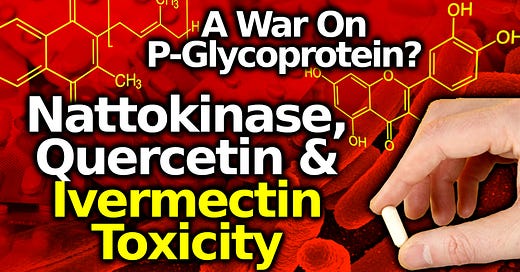


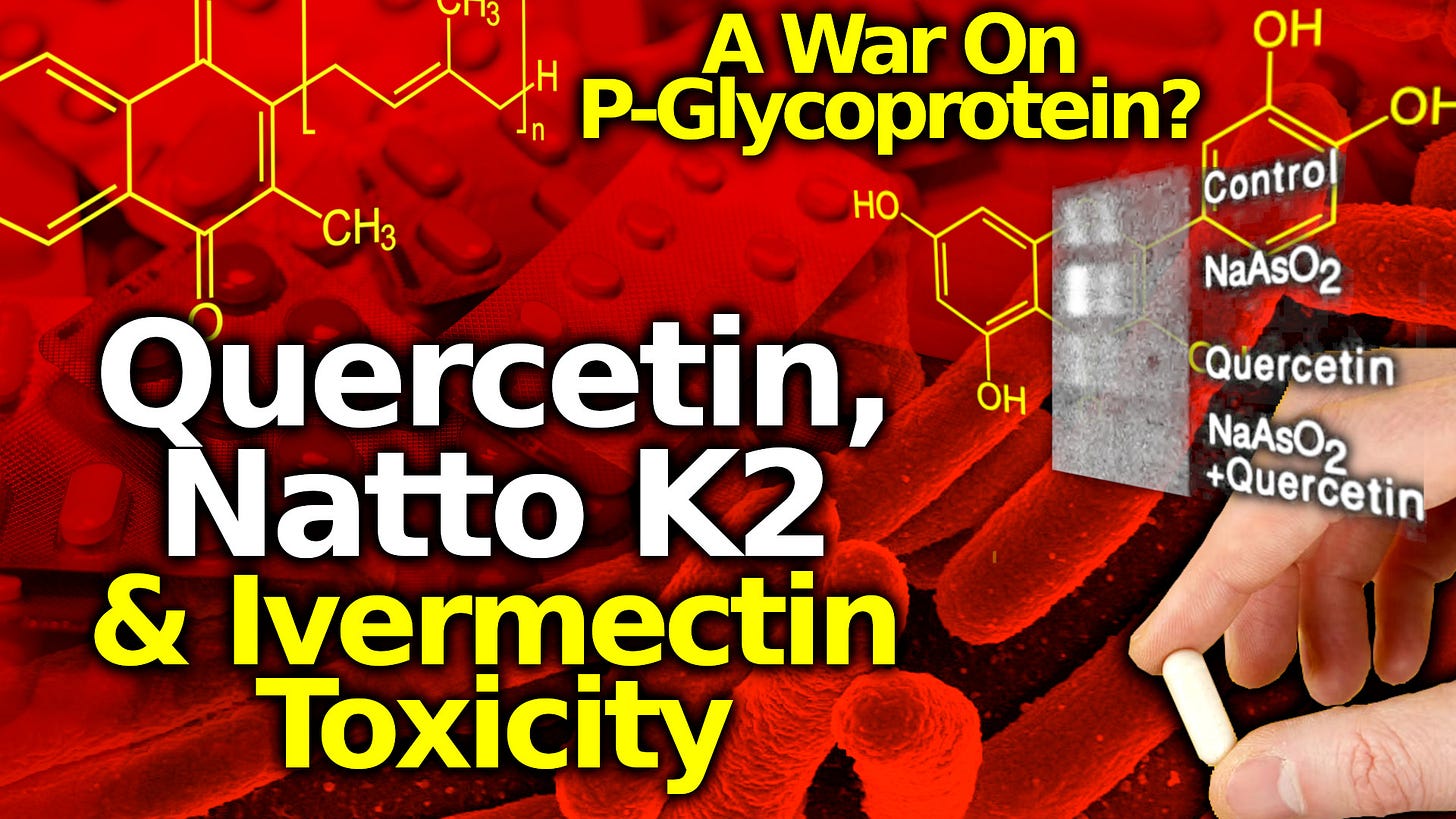


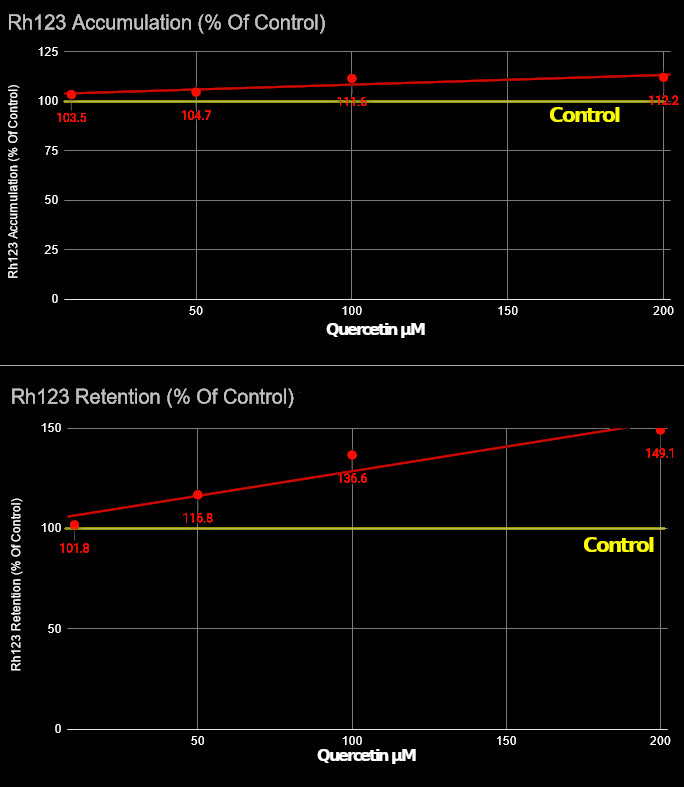


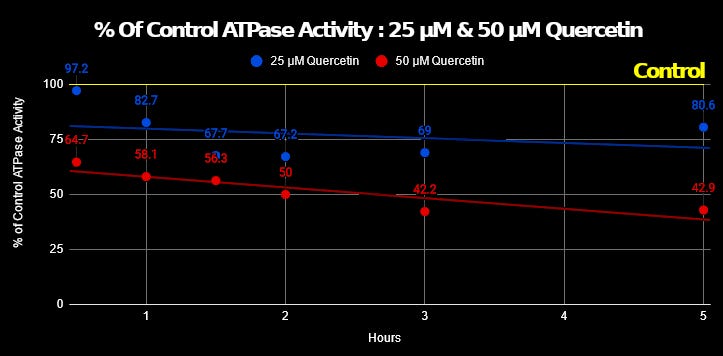
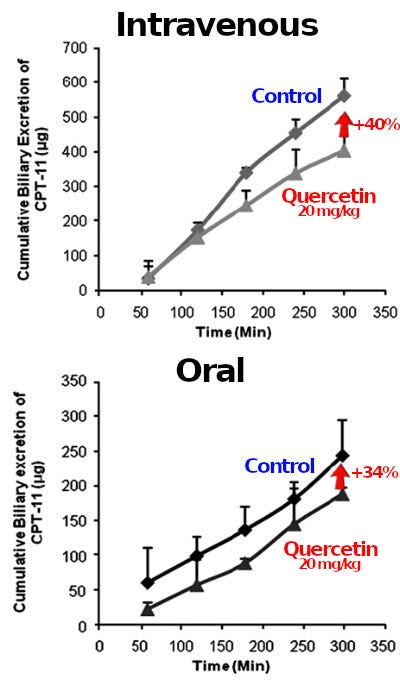
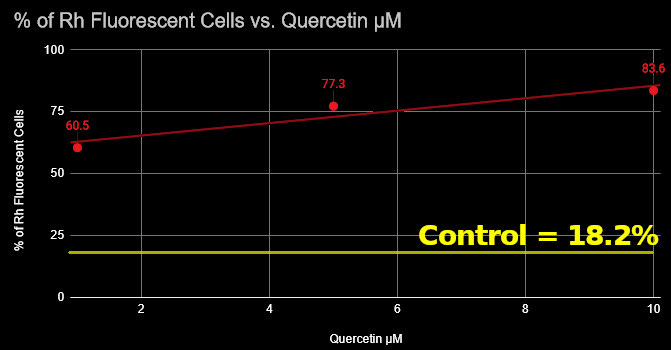


I think you are misunderstanding what the studies are saying. I just spent the last 5 hours reading about why medicines or herbs that dampen the expression of P-glycoprotein (P-gp) are highly sought after and used. In the instance of quercetin or Curcumin it’s to allow zinc to enter the cell membrane. The doctors make it very clear it’s about cell permeability and influx when they recommend it. The point is to inhibit the efflux of the medication aka toxins that P-gp actually causes so it’s quite intentional. True the medication can be a toxin as is the case with chemotherapy or a pesticide or antihelmitic (Ivr). This is why these medications should not be taken lightly and ofc ppl should be aware of side effects. The case for co-administration of Curcumin or Quercetin with Ivr is bc after Ivr is administered there is an opposite effect and there is actually greater representation of P-gp (look it up) which explains medicine resistant parasites. So you need an P-gp inhibitor after initial Ivr administration for the Ivr to cross into cell membranes and work. An entire study was done on this: “Ivermectin induces P-glycoprotein expression” which you can read here https://pubmed.ncbi.nlm.nih.gov/22024132/
So it would make sense that after initial treatment with Ivr a P-gp inhibitor would be co-administered.
In addition comparing Ivermectin to Digoxin more family known as Digitalis is incredibly unfair bc they are nothing alike and not in the same drug class so to imply an increased blood serum of Ivermectin would result in similar blood serum levels or death similar to a P-gp inhibitor plus digitalis is incorrect and unheard of.
Please at least represent this information to your audience also. You are comparing apples and oranges. As with all medicine you must weigh risks. Vilifying Dr. Kory just like the pro vaxxers does every long hauler and every vaccine injured patient a disservice.
I found your posts compelling and followed you but they do leave a lot out and are incredibly one sided. I fear you are only posting what fits your narrative. This does not lend to credibility. I at least concede there are risks and do believe that if P-gp is inhibited any drug will cross into where P-gp is most represented (brain, small instestine, reproductive organs, etc). Thank you for reading.
All these studies are BS! Show us who the scientist is and who paid for the studies. Ivermectin, HCQ, Quercetin are miracle drugs but cannot be patented anymore. Hence Pharma industry is spreading fake news. If any drug could kill people FDA would never ban it! Thats their primary goal. No amount of propaganda can change that fact!